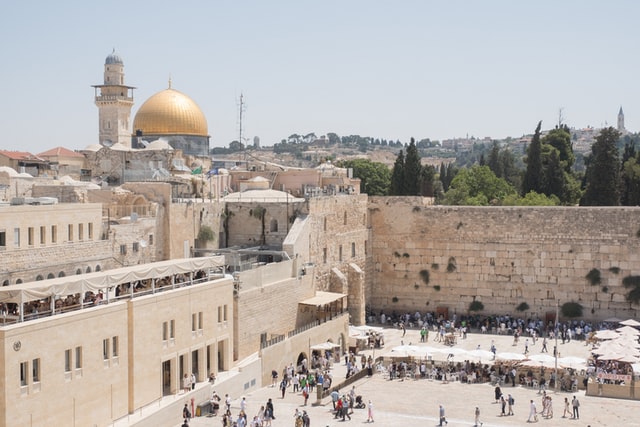Women of the Wall: Witnessing History at the Western Wall

I had the unbelievable experience of being present during a historic moment today. I was at Jerusalem‘s Western Wall during the Women of the Wall prayer service when, for the first time, police actively protected women donning prayer shawls. Since 1988, the Women of the Wall have met at the Old City’s Western Wall for the new Jewish month service and faced harassment and arrests.
Last month, the Jerusalem District Court ruled that they should no longer be arrested for wearing prayer shawls at the Western Wall and today the service went uninterrupted by the police, who protected the women from the hoards of angry ultra-Orthodox crowds.
I grew up as a Conservative Jew in New York, where egalitarianism was a natural part of my life.
The truth was, I wasn’t there to take part. I went because I had to be in Jerusalem for friends’ party for their new baby and my husband was reporting, so I figured, why not? I grew up as a Conservative Jew in New York, where egalitarianism was a natural part of my life. I learned how to read the Torah in middle school and my friends and I did it quite often because it was a skill we realized we were good at. When we went to synagogue with our families, we sat between our fathers and mothers. This all felt natural to us and we never thought twice about it.
But in Israel, that is not the case. Egalitarianism is unpopular. Although the country is mostly secular and I live in the very secular city of Tel Aviv, the vast majority of people still believe that Orthodox Judaism is the way. A woman wearing a prayer shawl is a strange sight. If Israelis go to synagogue–even once a year–women and men sit divided.
Egalitarianism was something that I didn’t want to give up though, and my husband and I got involved with a budding Friday night minyan called, Minyan Tel Aviv Shivyoni, or Tel Aviv’s Egalitarian Minyan. It got a ton of interest from an American and British crowd and 30-70 people attend the bimonthly services and monthly potluck dinner. There’s always a lot of singing and the services take place in different people’s apartments.
In a country filled with tension, Jerusalem’s unchecked tension unnerves me. It’s nice to be able to breathe in my city on the beach.
Maybe I should have been the kind of person who would navigate to Women of the Wall. But, I’m not interested in getting angry about praying at the Western Wall. I’d rather do my own thing in my own city, where everyone’s doing their own thing and no one really cares. In a country filled with tension, Jerusalem’s unchecked tension unnerves me. It’s nice to be able to breathe in my city on the beach.
Still, being at the Western Wall at 7 am with these women singing their hearts out and knowing that they would not get arrested for the first time was powerful. After the service ended, the police moved us all toward the gate and had us board a bus so that there wouldn’t be any skirmishes. In the packed bus, I can’t say I didn’t think of terror attacks of years past. But we drove away without incident, though ultra Orthodox young men banged on the bus, trying to obstruct its path.
When we reached Mamilla, an upscale outdoor shopping mall, I got out and headed to a cafe to get a cappuccino and get some work done. It was beautiful out, the sun shining on the golden stone and a light breeze in the warm air. And just like that, my day was back to normal. But only minutes before, history had taken place and I had been there to witness it.
Women of the Wall: Witnessing History at the Western Wall.








